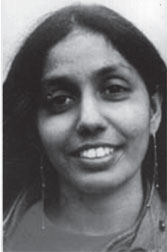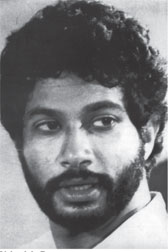In memory of Richard, Rajani and thousands of others
 Richard
de Zoysa was killed 21 years ago, on the night of February 19 1990.
Several poems were written in his memory in the months that followed,
and I have collected many of these in 'An anthology of Sri Lankan poetry
in English' as well as in 'Richard de Zoysa: his life, some work .....
and a death'. Appalling as his death was, it was not an isolated
incident, in the culture of violence this country had developed in the
decade before his death. This got worse in the two decades that
followed. More recently however things have improved, though there will
be need of constant vigilance to ensure that violence is not renewed. Richard
de Zoysa was killed 21 years ago, on the night of February 19 1990.
Several poems were written in his memory in the months that followed,
and I have collected many of these in 'An anthology of Sri Lankan poetry
in English' as well as in 'Richard de Zoysa: his life, some work .....
and a death'. Appalling as his death was, it was not an isolated
incident, in the culture of violence this country had developed in the
decade before his death. This got worse in the two decades that
followed. More recently however things have improved, though there will
be need of constant vigilance to ensure that violence is not renewed.
In Richard's memory, and in memory of all those who died
unnecessarily at the hands of those who saw violence as the only answer
to attitudes they opposed, I present here three poems from the
forthcoming collection of English, Sinhala and Tamil poetry that the
National Book Trust of India will be publishing later this year.
The first poem was written by Arjuna Parakrama, who was studying at
Pittsburgh at the time. It reiterates the belief that the killing was by
the death squads that functioned with impunity in those days.
There is little doubt now that they believed Richard was involved
with the JVP, and took him away and killed him as they had dealt with so
many others whom they suspected, with and without reason, of supporting
the JVP and its terrorist tactics at that period.
 |
 |
| Rajani Thiranagama |
Richard de Zoysa |
Those government paramilitary squads, which contributed to the
massive numbers of missing that Sri Lanka is still trying to account
for, ceased to function soon after Richard's death. I believe this was
because of that death, since those in government who felt things were
getting out of hand were able to assert themselves, given the uproar in
Colombo that - as Arjuna suggests - had not been affected similarly by
the deaths of thousands of others who were less well known. But there
has never been a proper inquiry to establish accountability, and there
has been no memorial lecture - which may say something about the power
of the establishment that Richard challenged.
Arjuna referred in his poem to Rajani Thiranagama who had died one
year earlier. The note to the translation by Lakshmi Holmstrom of
Cheran's poem says that 'Rajani Thiranagama, a lecturer at Jaffna
University, was shot dead in 1989 by the LTTE'. This was the time at
which they were seeking to establish themselves as the sole
representatives of the Tamils, and an independent voice like Rajani's
had to be suppressed.
She was the leading light initially of the University Teachers for
Human Rights of Jaffna University, a group that had no illusions about
the LTTE and no fears about criticizing them, even while fighting for
the rights of Tamils and attacking government action and inaction that
they thought culpable. In recent years their principal spokesman was I
believe Rajan Hoole, and I was sorry to read recently what seemed to be
his obituary. I hope I was wrong, because, even though I did not agree
with all they said, I believe their integrity and independence were
beyong question. Getting rid of Rajani and driving the rest away made
life much easier for the Tigers, in building up a totalitarian system.
But, as Cheran notes, Rajani's hands will continue to rise higher and
higher, and I hope that some at least of her hopes will be fulfilled in
the rebuilding of Jaffna now.
Rajani
Now, in a little while
the sun will set,
darkness will fall.
The darkness that is yet to come
will not be as before
but the very devil-
a night that has murdered the moon
and set fire to the stars;
an ash-smeared night.
You hurried on your way
hoping to light a small hand-lamp
or at least a candle
before such a night could fall.
Amma,
today they were in great haste
arriving from the south-
Death's messengers
with their rifles
and their five bullets.
As you fell
the sun's last rays
threw upon the wall
your shadow:
your waving hands rising
higher
and higher
beyond the horizon.
Finally, a poem by Buddhadasa Galappathy provides another perspective
on the violence in the south of the country at that period. Though it
could be argued that the government of that time had driven the JVP to
violence by proscribing it unfairly, the JVP had embraced the
opportunity offered to them, and moved swiftly and effectively to
tactics of violence and terror.
It is easy now to forget how they would insist on households
remaining in darkness, to express opposition to government, and kill
anyone who disobeyed. Within a few months, in many parts of the country,
their writ ran supreme, and they nearly succeeded in bringing the
country to a halt.
The poem is taken from a collection entitled 'The Night is quiet',
and was translated by Malini Govinnage. It expresses very simply the
fate that befell many, for reasons that had nothing to do with the
political tyrannies that overwhelmed the country on different sides and
in different ways during that ghastly period.
The stealing of a jewelled lamp
Comrades, I need an answer
As to why you killed my husband
When he broke your law, the
Law of Darkness
When you forbade the lighting of lamps
To make your point
He is not guilty
He obeyed your law
It was me
Who made him break it
For the offence
Of lighting a lamp
You have put out the lamp
That brought light to my household
It was not he who wanted it lit
But I, to quieten my little son
Who feared the darkness
I Asked him to light the lamp
Where is your justice?
Why could you not find out
The reason he broke your law
Before you put out the lamp of my life?
Tr. Malini Govinnage
*********
For Richard
They say they didn't kill him, so maybe Richard didn't die,
Like thousands less famous that have disappeared before;
The Police inquiry has absolved the Police of any blame
And now the government will surely rush to perpetrate the same.
It's a mistake it seems, like thousands past, more costly though,
To cover up.
You'll get eulogies, a funeral for what it's worth
A memorial lecture next year, that Sena and thousands
Of others won't . No one will grudge you that
In this grotesque unequal exchange we celebrate as life.
Richard, you are greater here than Richard
Than Richard-Rajini-Sena-a-thousand-names you share,
That's fitting too, you who had more accomplishments than
Was fair in one person anyway.
So it's not about agreeing, special circumstances, old school ties,
Sometime friendship, theoretical debate,
Not even your work, for me, though this is harder to dismiss,
Not your so easily-worn brilliance, nor your visibility
That protected you until they turned you into an example
No, this is not about agreeing,
Nor is it to pick at the dry bones of old errors of judgement,
Not even to dissect the politics of personal trust and patronage.
It is then, about a life, your larger-than-life life, a thousand
Lives, LIFE: they chose yours to mutilate as a warning to the rest,
And that must be the strangest of compliments;
They are sick, desperate, berserk with self-righteous hate,
But they cannot afford to mistake their enemies for their friends.
So, this is not about agreeing.
We do different things differently, there are many ways to care
About what one does: what you did no one did better, Richard.
It is about life, then, and work ahead, and going back for me.
And death, your death; more than a thousand deaths.
What death?
*********
|

